|
idhrendur posted:Have I mentioned before that Gothia is starting to look like it's filling a hexagon. Maybe it'd be worth completing that shape. And if I'm seeing the geography right, most borders would be rather defensible if that was done. Time to figure out how to say L'Hexagone in Gautés.
|
|
|
|

|
| # ? May 10, 2024 16:00 |
|
idhrendur posted:Have I mentioned before that Gothia is starting to look like it's filling a hexagon. Maybe it'd be worth completing that shape. And if I'm seeing the geography right, most borders would be rather defensible if that was done.
|
|
|
|
Ofaloaf posted:Russia's not Russian, it's all Mordvin and Finnic of some sort or another. "Hoykka" is one of the surnames thrown in the revised Smolensk country file, but I can't recall where I got it from before that. It's either properly Finnish, or I found it somewhere while trying to work out Mordvin names. It's almost exactly the same as the Finnish "houkka", which means crazy/stupid in general but in Orthodox context can specifically be a person that's sort of a holy jester, a fool for Christ. https://en.wikipedia.org/wiki/Foolishness_for_Christ posted:In his book Holy Fools in Byzantium and Beyond, Ivanov described "holy fool" as a term for a person who "feigns insanity, pretends to be silly, or who provokes shock or outrage by his deliberate unruliness." [8] He explained that such conduct qualifies as holy foolery only if the audience believes that the individual is sane, moral, and pious. The Eastern Orthodox Church holds that holy fools voluntarily take up the guise of insanity in order to conceal their perfection from the world, and thus avoid praise.[8] Pretty spot on!
|
|
|
|
Really enjoying this LP. Looking forward to watching how the New World develops, especially once North America starts getting colonized.
|
|
|
|
I really want The Gnostic Gnights of Gnegypt to get colonizing East. Come on guys! You're the best path to spices anyone in Europe has!
|
|
|
|
Val Helmethead posted:I really want The Gnostic Gnights of Gnegypt to get colonizing East. Come on guys! You're the best path to spices anyone in Europe has! These guys are amazing btw, they're like a mashup between the IRL Mamluks and Knights Templar, I hope they live.
|
|
|
|
I like to imagine they are doing what the Turks did - guzzling down ridiculous amounts of coffee, sending cotton and grain everywhere, making everyone else jealous of how wealthy their traders are getting because they're bringing over small amounts of ridiculously expensive spices with their cheap grain and cotton.
|
|
|
|
Gnostic Knights... if they die, does that mean we'll get a Blind Dead reference or two later on? 'Cause I know that'd amuse me to no end.
|
|
|
|
Val Helmethead posted:I like to imagine they are doing what the Turks did - guzzling down ridiculous amounts of coffee, sending cotton and grain everywhere, making everyone else jealous of how wealthy their traders are getting because they're bringing over small amounts of ridiculously expensive spices with their cheap grain and cotton. The Knights of the Gnostic Coffee House
|
|
|
|
Val Helmethead posted:I like to imagine they are doing what the Turks did - guzzling down ridiculous amounts of coffee, sending cotton and grain everywhere, making everyone else jealous of how wealthy their traders are getting because they're bringing over small amounts of ridiculously expensive spices with their cheap grain and cotton. The Hansaetic Knights of the Holy Sepulchre in Alexandria?
|
|
|
|
HailedUser posted:The Knights of the Gnostic Coffee House This reminds me... we had a couple really nice Saudi fellows (that is, docs in a fellowship program stateside) share with us their version of Turkish coffee and it was baller as hell. It'll probably offend any coffee purists in the thread, but during a dinner party, the dudes served us strong as gently caress coffee brewed with spices and finished with milk. I never got the exact spices used out of 'em, but I know fresh ginger and cardamom pods were used, and I'm fairly sure whole cloves and possibly nutmeg were also involved. It was really lovely. I'm imagining the Gnostic Knights of Gnegypt sitting around with an embellished silver coffee service sipping expensive spiced coffee.
|
|
|
|
POOL IS CLOSED posted:This reminds me... we had a couple really nice Saudi fellows (that is, docs in a fellowship program stateside) share with us their version of Turkish coffee and it was baller as hell. It'll probably offend any coffee purists in the thread, but during a dinner party, the dudes served us strong as gently caress coffee brewed with spices and finished with milk. I never got the exact spices used out of 'em, but I know fresh ginger and cardamom pods were used, and I'm fairly sure whole cloves and possibly nutmeg were also involved. It was really lovely.
|
|
|
|
Deceitful Penguin posted:Turkish coffee culture and its derivatives are totally fuckin' rad and Italian/Austrian can't compete It's definitely an aspect of coffee that hasn't gotten nearly enough love stateside, even with the advent of combinations like dirty chai (espresso shots in masala spiced tea). The historical spice trade is some fascinating, bloody poo poo all on its own; I imagine that the historical coffee trade has some strong parallels.
|
|
|
|
Turkish espresso with cardamom is life changing.
|
|
|
|
I'm not even a coffee lover (despite my wife's efforts), and I'll agree that Turkish coffee is amazing.
|
|
|
|
East African coffee with popcorn's pretty good too.
|
|
|
|
Chapter 50: The Gothic Reformation (1496-1514)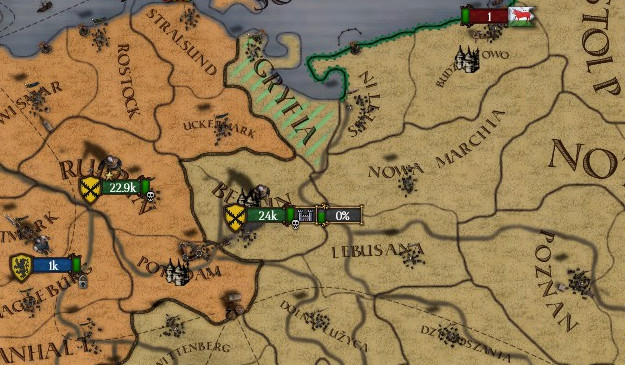 King Tiuderic X came to the throne prematurely; too young to exert control himself, his reign began both with a regency and a war. The regency was benign; the regent himself was the young king's own father, Totila, whose main fault was his inability to shake off rumors of Reformation sympathies. The war itself concerned control of one of Götarike's many southern Baltic enclaves, and compelled Gothia to focus on foreign affairs, letting domestic issues such as clandestine Reformation churches to fester. 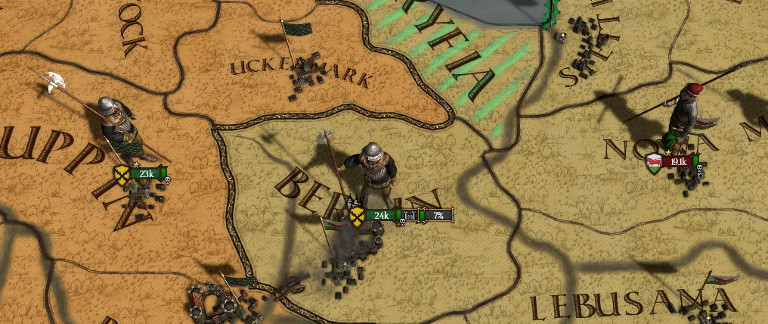 Gothic participation in the war was largely limited to actions along the western Sorbian frontier. Neither Regent Totila nor young King Tiuderic had much invested in its outcome; late Queen Puelle had gotten Gothia involved purely due to her own dynastic sympathies with Götarike, which had just been inherited by a cousin of the Gothic royal family. Neverless, within the theater which Totila and Tiuderic limited themselves to, Gothic troops were directed competently and fought well. The Battle of Berlin, fought in July of 1496, saw Sorbian troops lured into a fight against superior numbers; they were able to inflict nearly the same amount of losses on the Goths that they themselves suffered, but were still ultimately defeated and routed. 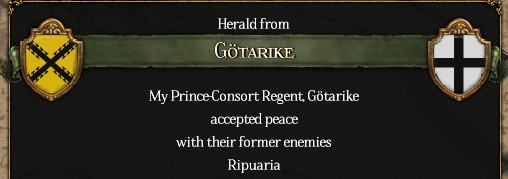 Such victories prompted Sorbia's allies to look for a way out of the war. Ripuaria was the first to reach terms with Götarike, in January of 1497, and other minors allies of Sorbia soon followed. 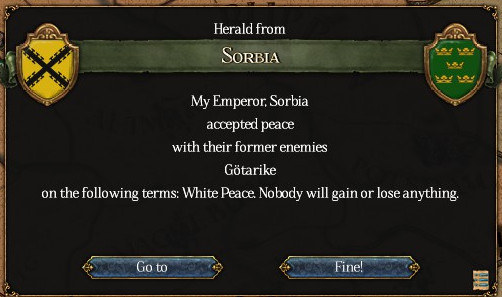 Sorbia itself soon folded, but the following Peace of Tuchola (1497) satisfied no-one. The return to the status quo ante bellum meant that Sorbia still maintained a claim on Geatish lands, that nobody gained lands anywhere, and that Gothia received no compensation for the sums it spent helping its ally.  The treaty also marked the end of Tiuderic X's regency. The young king was now a young man, a generally competent figure with a budding enthusiasm for the newest advances in architecture and construction.  The tooltip lied, no center of reformation appeared. With the war out of the way and the regency over, King Tiuderic turned to the one matter his father had raised him to think about : the Reformation. Rumors of Regent Totila's crypto-Conciliarism turned out to be well-founded; the regent had worked assiduously to turn his son against Orthodox teachings. One apocryphal account described a royal reception for the patriarch's legate from Constantinople. Totila joined the legate on his way to the reception, and began speaking hurriedly to him in Gothic. The legate, a Vlach from the east, struggled to keep up with the regent's conversation and grew increasingly frustrated. As they reached the hall with the young king present, the legate finally snapped and yelled “Stop! Stop! I do not understand!”, just as the regent switched to Latin. All young Tiuderic saw was an official representative of the Church loudly proclaim his inability to comprehend the language of the Church and high learning. Unaware of his father's manipulations, he grew contemptuous of the Patriarch of Constantinople. Almost from the moment his independent rule began, Tiuderic began speaking out against the Ecumanical Patriarch. “He answers to no Roman, but thinks himself an emperor, in control of all priestdom,” the king is said to have complained to a courtier. “Did not Constantine the Great call the church to councils himself?” 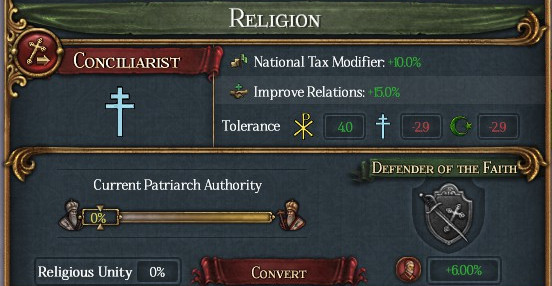 Tiuderic's mother, Empress Puelle, had already declared Conciliarism a heresy that would automatically bar anyone from the imperial crown. Tiuderic was deadset on following his beliefs; on Christmas Day, 1498, the Gothic king called for a council of priests from across Gothia to convene in Liyun for the purpose of “resolving the disagreements between those members of the august faith who are for and against measures of reform”. Of course, by calling the council himself, Tiuderic was committing himself to the Conciliarist cause, and the men who attended the resulting council (variously known as the 'Gothic Council' or 'Council of Schism') near unanimously endorsed Conciliarist teachings. 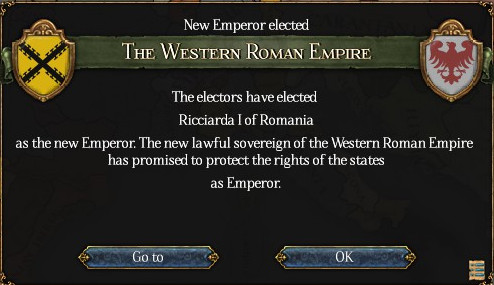 The Imperial electors responded to this unilateral change by enforcing the law; Tiuderic's cousin, Queen Ricciarda Triarius of Romania, was hailed the new Empress of Rome. Tiuderic, having known full well the cost of his conversion and resigned to the consequences, continued to style himself 'Roman Emperor' in correspondences but otherwise did not resist his deposition. Tiuderic's lack of resistance to his loss of the imperial regalia can also be attributed to the state of Gothia at the time of the king's conversion- largely thanks to Empress Puelle's efforts, Gothia had mostly resisted the lure of Reformation, and was overwhelmingly Orthodox. King Tiuderic's position was extremely precarious within the realm, and the conversion of the Goths became the king's top priority.  Firstly, the court had to define exactly what the kingdom's new faith exactly was. To that end, the resolutions of the 1498 Gothic Council were codified into an Act of Uniformity, meant to firmly establish Conciliarism as the new faith of Gothia and specify its teachings. 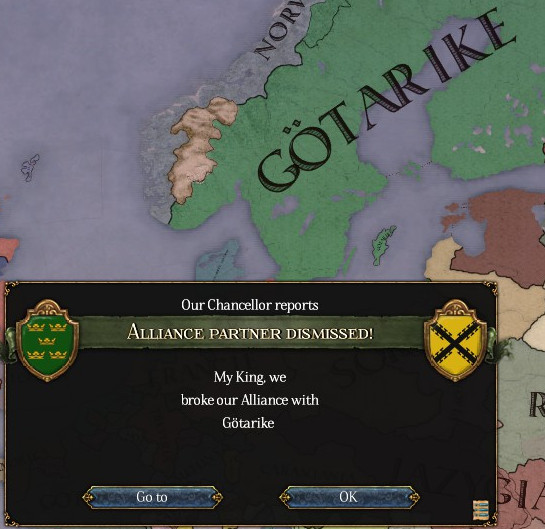 With the loss of the imperial office, Tiuderic also lost access to the imperial bureaucracy, creating a strain on the remaining Gothic diplomatic service. Götarike, responsible for a significant drain on Gothic coffers during the recent regency, located on the far side of Europe from Gothia, and still resolutely Orthodox, was removed from the Goths' web of alliances. 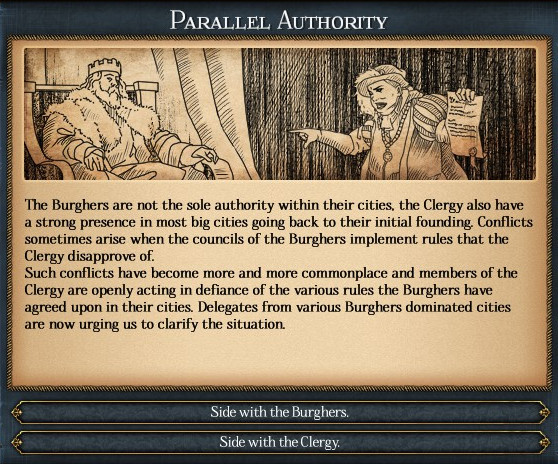 Tiuderic's embrace of the Reformation also led to frictions in wider Gothic society. The king's crackdown on Orthodox practices prompted burghers to challenge the longstanding authority of local clerical institutions within the kingdom. In some cases, this lead to rioting, as was the case in Bordelh, but in most cases the royal court's new anti-clerical leanings caused local clergy to cede power without a fight. 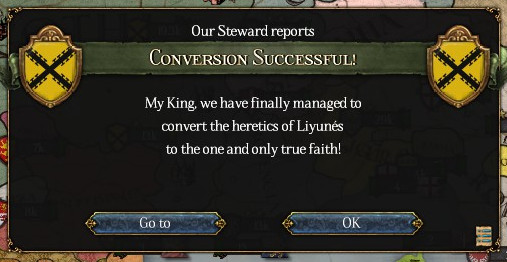 Slowly, the king's idea of Reformation was pressed upon the realm. 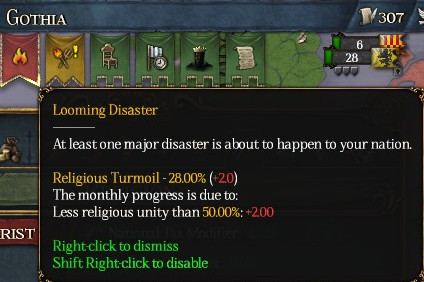 Too slowly, it turned out. Resentment of the king's break with the Orthodox Church steadily grew in the countryside, where royal officials had begun seizing select church properties as part of a broader dissolution of ancillary church offices and reorganization of the reformed 'Conciliar Church' in Gothia. With the slow pace of reform in the provinces, the realm was hurtling towards great religious turmoil. 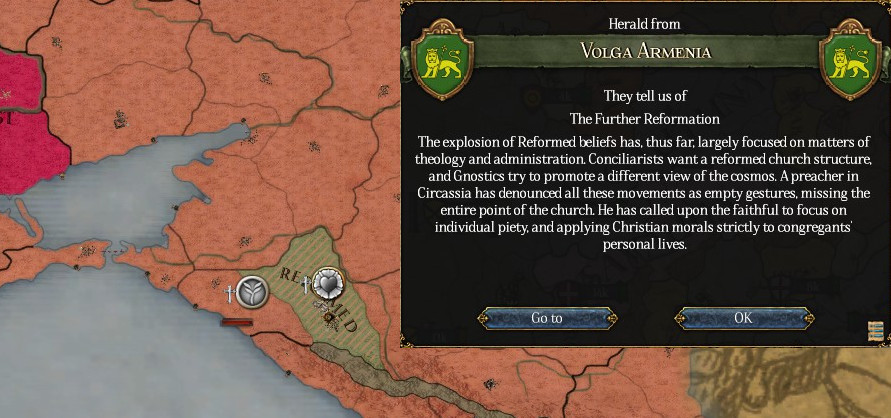 At the same time that conservatives were resisting efforts to reform at all, others were insisting that the Reformation had still not gone far enough. Mzhezh the Bald, a preacher from the Circassia region of Volga Armenia, published his seminal work, The Defense of Christ, in May of 1500. It initially gained little traction in his home country, but translations of his treatise soon spread westward and his name, Latinized to Mizizius Calvus (erroneously rendered Calvinus in some works), became well-known by those who sought to preach a “purely Reformed” Christianity. 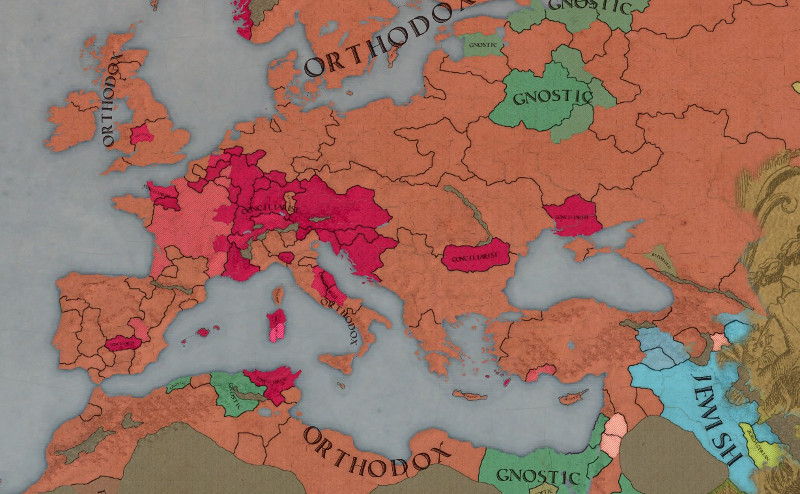 With the introduction of  Making that period of religious turmoil all the more dangerous, Europe was in the midst of a revolution in military thinking. The growing presence of gunpowder weapons was encouraging a similar growth in military administration and logistics, necessitating a further professionalization of the officer corps, and demanding greater coordination between civil and military spheres of government. All together, these changes meant that battles were becoming more lethal, just as Christendom was being torn asunder.  Fortunately for Europe (and unfortunately for everyone else), on the horizon there were alternate outlets for Europe's aggression. The first European colonies had begun to spark a greater intellectual and material interest in the New World, encouraging further exploration, colonization and conquest. Already, Gothia had established a presence in the Caribbean, while the British realm of Loegria had begun colonizing the coast of Brazil. 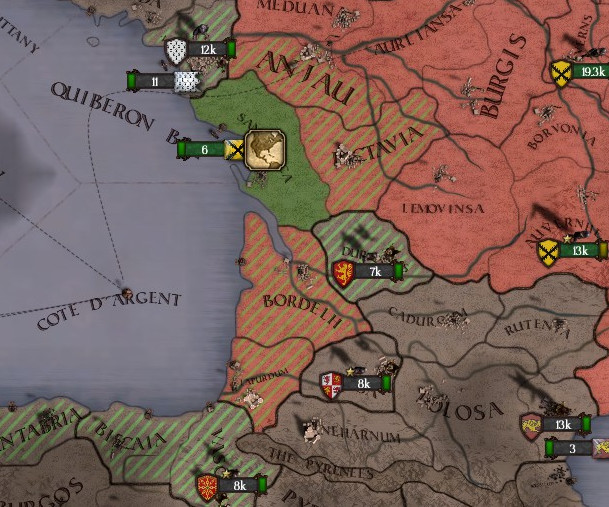 Much of this New World-Old World exchange centered around the Gothic port of Sanctonas, which has become widely considered the “Birthplace of Colonialism”. From Sanctonas and the province of Santonica, the idea of colonialism would quickly spread across Europe. 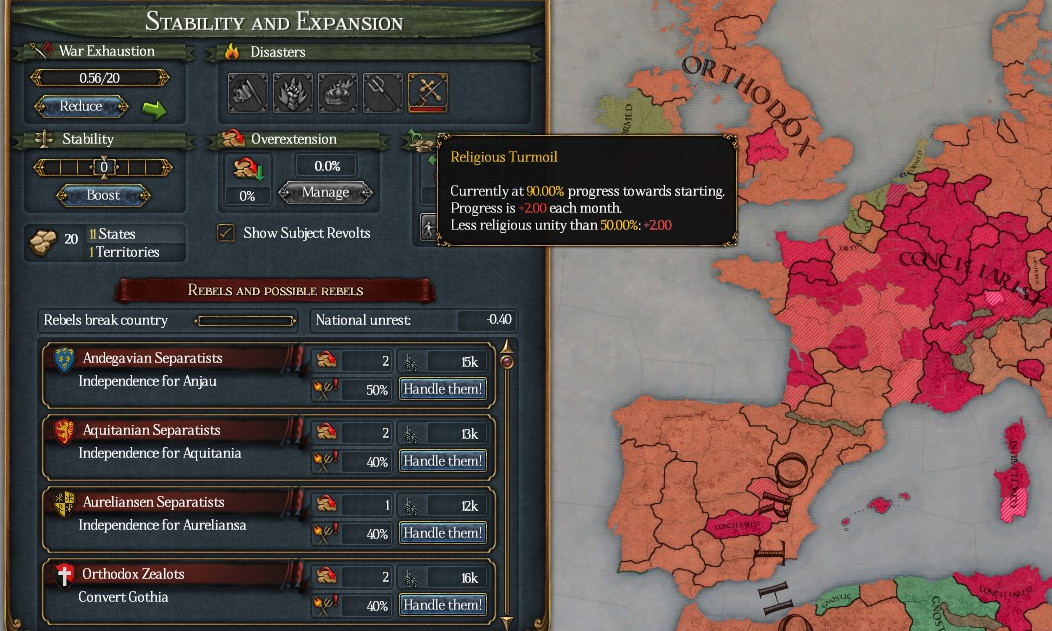 These global advances, while useful to Gothia in the long term, offered no help in its immediate struggles with bubbling religious anger. Efforts to stamp out Orthodoxy had produced some results, but they simply were not enough to stop the growth of discontent. 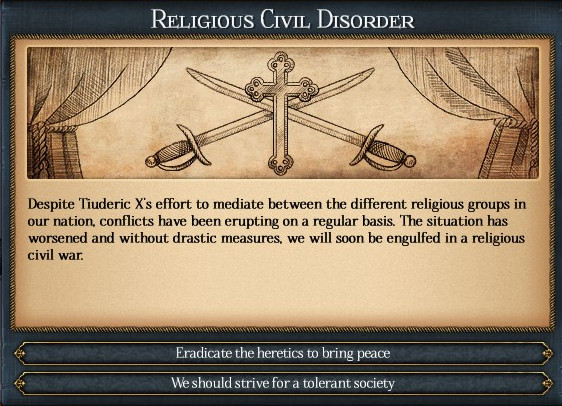 Matters came to a head on February 13th, 1503, when crown officials attempted to close a monastery in Nivčrns. Just as the bailiff in charge of the dissolution left the religious house, one of the ejected monks attacked him, and the gathered crowd of onlookers joined in.  The rebels enjoyed some small measure of initial success. Nivčrns itself was seized, the ejected monks were restored to their monastery by a roaring crowd, the rebels proclaimed themselves the 'Soldiers of Christ', and their leader, Uc Drautine, petitioned King Tiuderic to restore Orthodoxy to the realm. 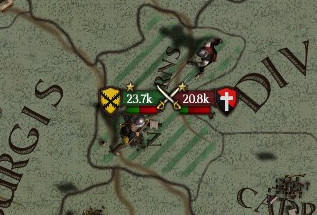 Tiuderic responded by sending in the army and killing them all. 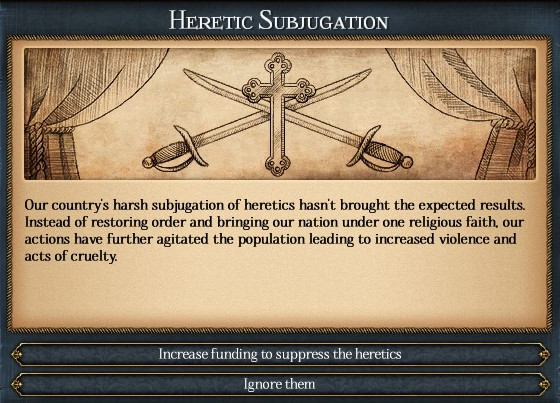 The suppression of the Nivčrns Rising temporarily put a lid on further unrest, but the court was sure that the Rising wasn't the end of the turmoil. Additional funding was funneled into the suppression of heresy, to the detriment of Gothia's colonization program. 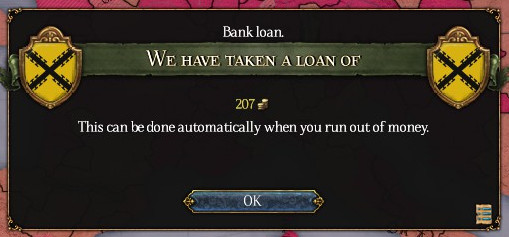 Even with colonization funding cut, the realm's finances were severely strained by Tiuderic's anti-Orthodox program. Loans from several sources had to be taken to keep the government afloat. 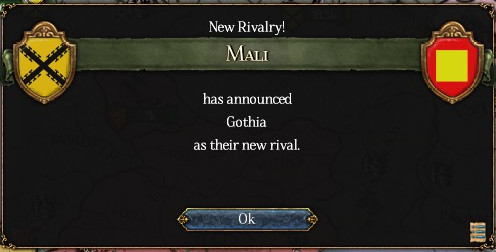 Tiuderic's aggressive and downright reckless Reformation campaign prompted recriminations from across the Orthodox world. Even Orthodox Mali, on the far side of the Sahara, send an envoy to Gothia, beseeching Tiuderic to bring back the realm to Orthodoxy “lest he dare risk the King of Mali's wrath”. 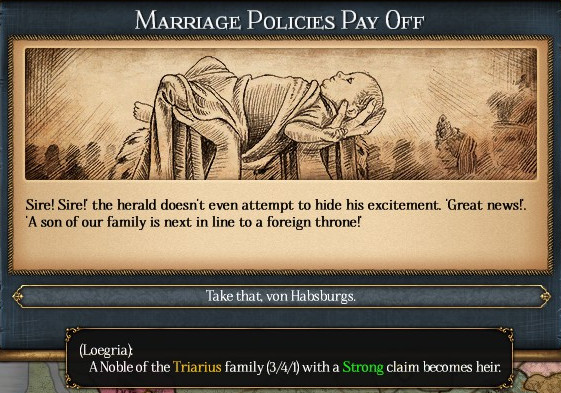 King Tiuderic was not fazed by these gestures, but did work to shore up the realm's few remaining positive relations. In Loegria, particularly, Tiuderic's envoys managed to achieve a singular success when they managed to secure a Reformation-friendly prince of the Triarius dynasty as heir to the Loegrian throne. 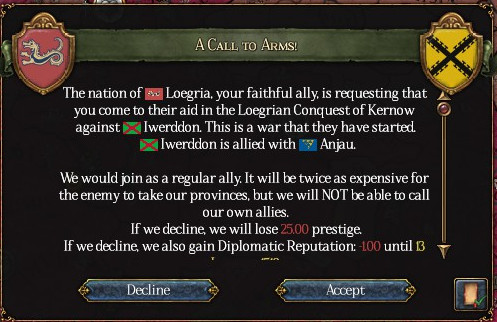 Loegria also used the promise of a Triarian heir to pull Gothia into a war against Iwerddon. Iwerddon's king, like Tiuderic, had enthusiastically embraced the Reformation; unlike King Tiuderic, however, Iwerddon had turned to the Reformed faith. This war between Iwerddon and the Loegrian-Gothic alliance, in 1505, possibly marks one of the first wars in Europe between two of the competing Reformation faiths. 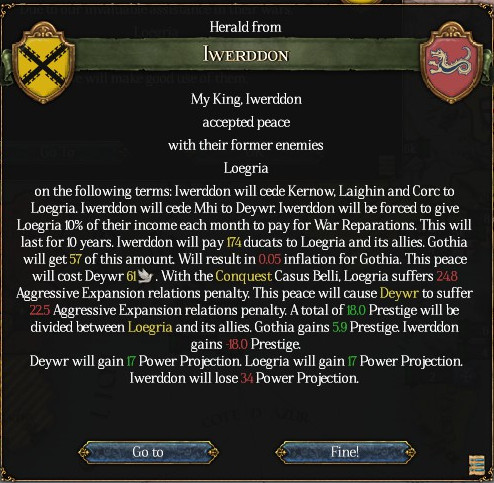 For Gothia, the war was short and uneventful. A minor skirmish in the neighboring duchy of Anjau was the only action Gothic armies saw during the war. Nevertheless, the Loegrian court appreciated the Goths' gesture of support, and the kingdom received a decent gift of gold back in gratitude. 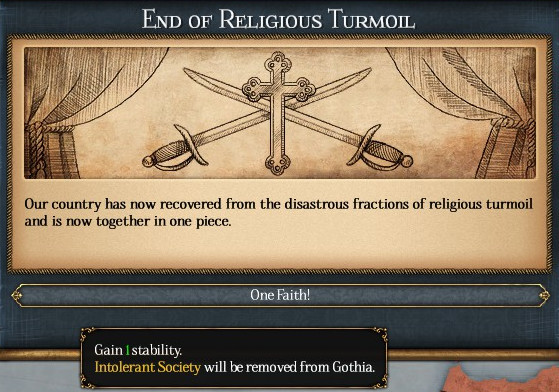 Roughly in the same period, in mid-1506, the religious turmoil within Gothia died down, and the worst pangs of converting the realm to Conciliarism had passed. 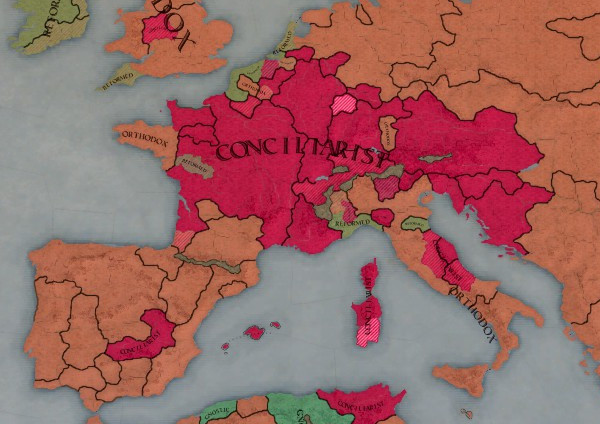 With the Goths' conversion, most of Gaul was now Conciliarist, and a respectable Conciliarist bloc was forming in West-Central Europe. 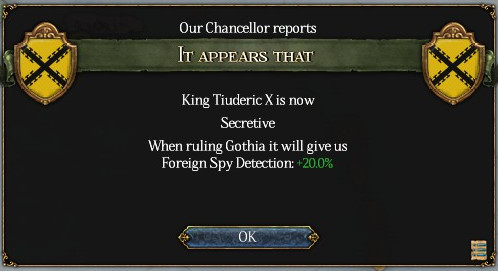 The shocks of the religious uprisings had taken their toll on King Tiuderic, nonetheless. As the king grew older, he grew more paranoid and secretive. Council meetings which had once included grand gatherings of all the realm's highest dignitaries were reduced to huddled gatherings of the King's closest advisers in a dimly-lit room. Royal proclamations were issued without public consultation of the nobility, sometimes even without the consultation of key advisers. The time of turmoil had left its scars on the monarch. 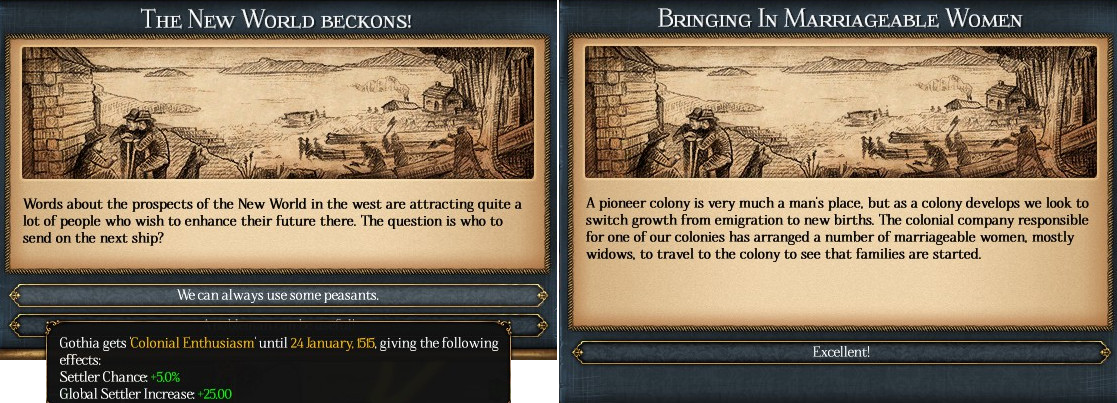 The risings had also driven many people out of their homes, men and women alike. These uprooted people gave the Gothic colonization effort a much-needed boost after the resource-starved years of the revolts. Hundreds moved overseas to the Caribbean colonies that were beginning to be called 'Little Gothia'. 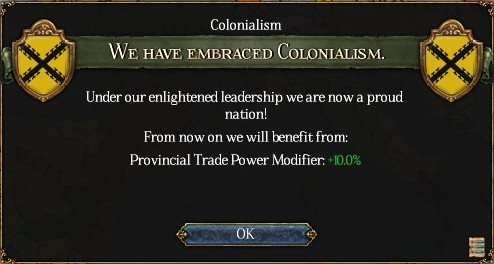 The explosion of support for the colonial effort was so great that the era of Gothic colonialism is generally considered to have begun in the 1510s, after the period of religious turmoil and the Loegria-Iwerddon war, rather than when the kingdom actually established its first New World colonies in the late 15th century. Against the general drift of the nation, King Tiuderic had dragged Gothia into the Reformation. Ultimately, he did succeed in turning the realm Conciliarist, but at the cost of the imperial regalia, money and men. While Gothia struggled with its religious turmoil, however, the groundwork was being laid for a new era of colonial expansion abroad. Map of the known world, 1514: 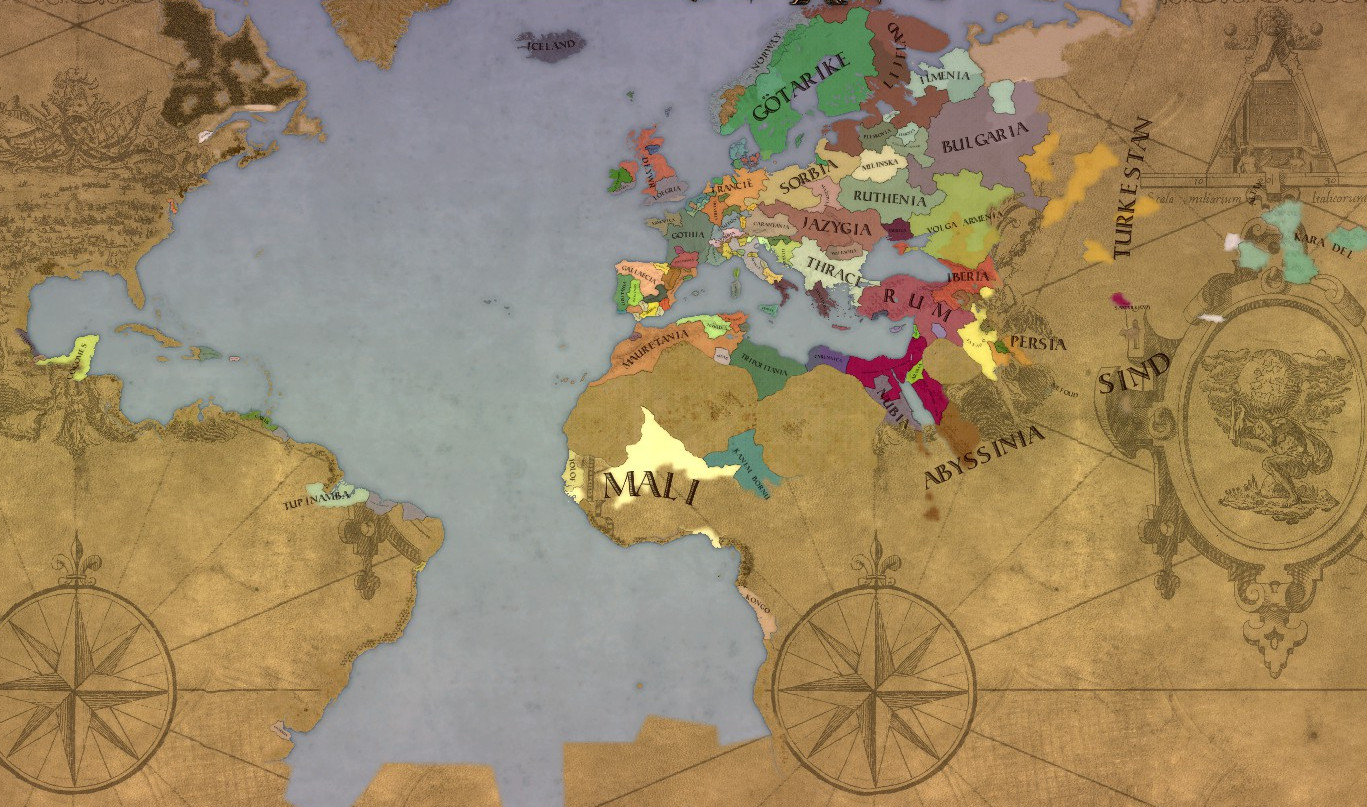 Map of Europe, 1514: 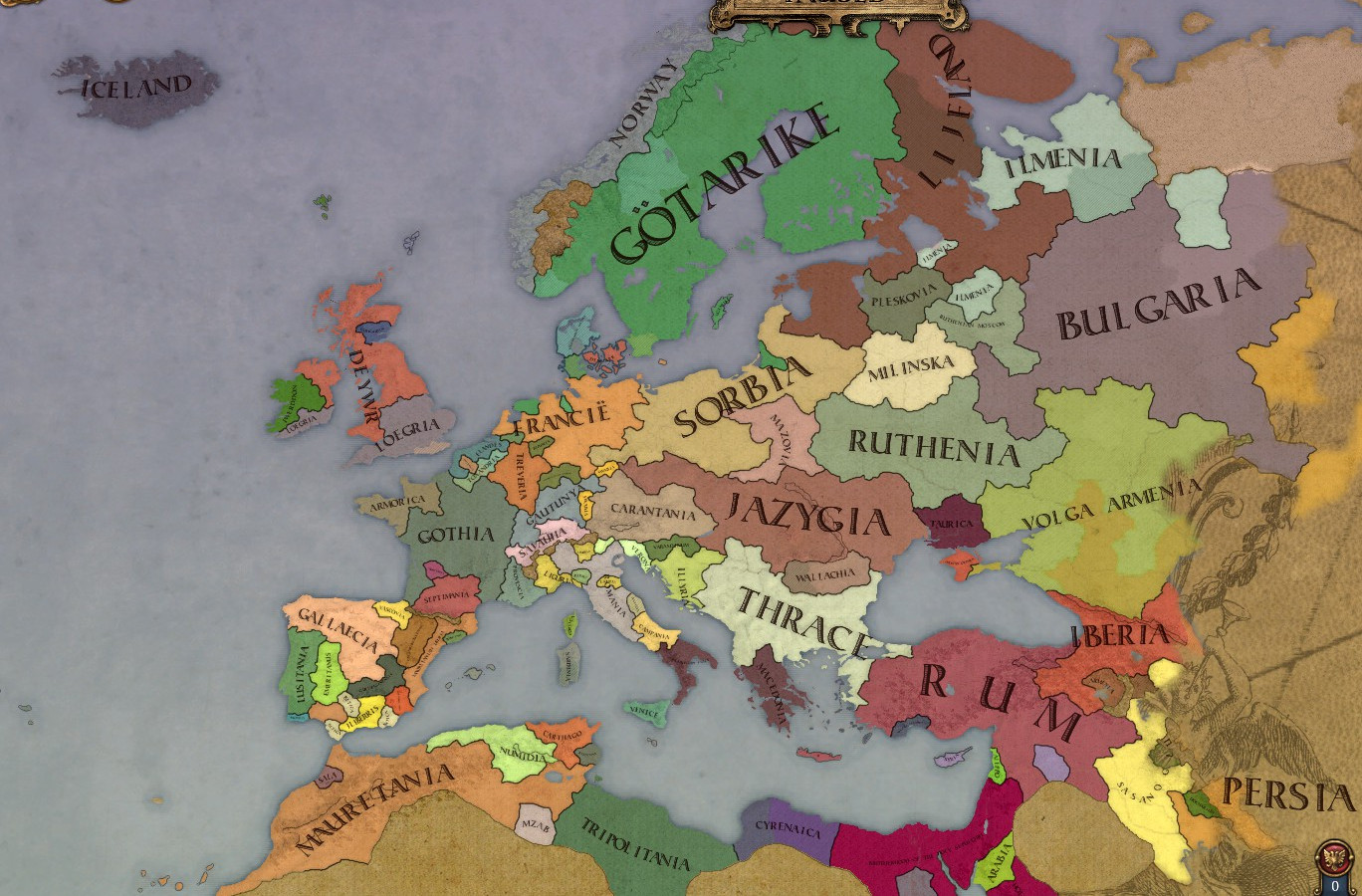 Religious map of Europe, 1514: 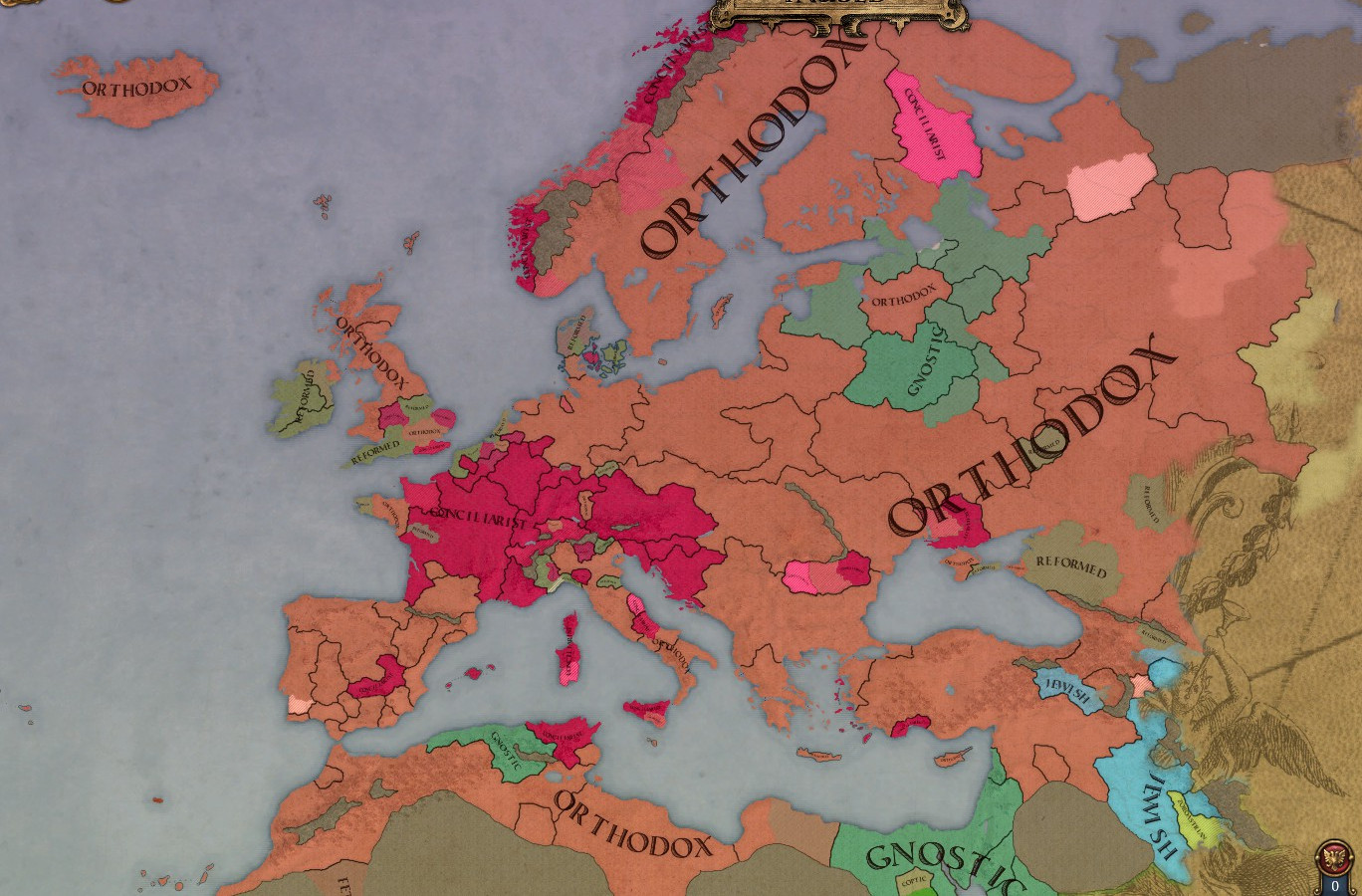
|
|
|
|
Traitor! Heretic! False emperor and falser king! Tiuderic the Mad has stolen Gothia from the bosom of Mother Church and butchered her children for the sake of his vanity and greed! He has destroyed Gothia and the House of Triarius's rightful place in the empire and world, for nothing! This man, this creature, this thing, is no true sovereign of we proud and faithful Goths! How could it be so? No, he is an agent of discord and evil, a demon in stolen flesh, here to funnel weak-willed souls to his master in Hell, while destroying God's own sword and shield in Europe! It cannot stand! It will not! Death to Tiuderic! Death to the Concilarist traitors!
|
|
|
|
Ally with Norway as a bulwark against the Gautes of Scandinavia
|
|
|
|
Oh, how did I miss that Jerusalem is in the hands of the Gnostic Knights
|
|
|
|
That was an easier conversion than I might have expected. Though there's sure to be turmoil in the Empire as a result.
|
|
|
|
The religious map is already a giant mess, I'm looking forward to seeing what it looks like by the time the reformation has matured.
|
|
|
|
Lord Cyrahzax posted:Traitor! Heretic! False emperor and falser king! Tiuderic the Mad has stolen Gothia from the bosom of Mother Church and butchered her children for the sake of his vanity and greed! He has destroyed Gothia and the House of Triarius's rightful place in the empire and world, for nothing! This man, this creature, this thing, is no true sovereign of we proud and faithful Goths! How could it be so? No, he is an agent of discord and evil, a demon in stolen flesh, here to funnel weak-willed souls to his master in Hell, while destroying God's own sword and shield in Europe! This so-called "Western Roman Empire" has always been false. Now that the scales have been removed from your eyes, I hope you will join me in declaring that this Carthaginian Empire must be destroyed.
|
|
|
|
Lord Cyrahzax posted:Traitor! Heretic! False emperor and falser king! Tiuderic the Mad has stolen Gothia from the bosom of Mother Church and butchered her children for the sake of his vanity and greed! He has destroyed Gothia and the House of Triarius's rightful place in the empire and world, for nothing! This man, this creature, this thing, is no true sovereign of we proud and faithful Goths! How could it be so? No, he is an agent of discord and evil, a demon in stolen flesh, here to funnel weak-willed souls to his master in Hell, while destroying God's own sword and shield in Europe! Never stop
|
|
|
|
QuoProQuid posted:This so-called "Western Roman Empire" has always been false. Now that the scales have been removed from your eyes, I hope you will join me in declaring that this Carthaginian Empire must be destroyed. The worst mistake our noble nation ever made was attaching ourselves to that vile and bloated beast. Gothia must throw off the chains that keep us bound to this monster for most of these five centuries. Let this false Empire rot and die, we find our own, true path to the future.
|
|
|
|
What exactly was the benefit to throwing away the Empire for conversion?
|
|
|
|
Rodyle posted:What exactly was the benefit to throwing away the Empire for conversion? This. Lord Cyrahzax posted:Traitor! Heretic! False emperor and falser king! Tiuderic the Mad has stolen Gothia from the bosom of Mother Church and butchered her children for the sake of his vanity and greed! He has destroyed Gothia and the House of Triarius's rightful place in the empire and world, for nothing! This man, this creature, this thing, is no true sovereign of we proud and faithful Goths! How could it be so? No, he is an agent of discord and evil, a demon in stolen flesh, here to funnel weak-willed souls to his master in Hell, while destroying God's own sword and shield in Europe!
|
|
|
|
Rodyle posted:What exactly was the benefit to throwing away the Empire for conversion? Since the Reformation's been rolling for a while, and some of the biggest supporters of it have been Electors, I haven't been able to convert the empire totally back anyways. Because of that, Imperial Authority is just always tanking regardless of what I do (thanks, heretic princes!) so all the cool So I couldn't strengthen my hand as emperor easily, I could make more money if I converted, and regardless of religion Gothia's in good enough shape now to bully most European countries. Furthermore, Lord Cyrahzax posted:Traitor! Heretic! False emperor and falser king! Tiuderic the Mad has stolen Gothia from the bosom of Mother Church and butchered her children for the sake of his vanity and greed! He has destroyed Gothia and the House of Triarius's rightful place in the empire and world, for nothing! This man, this creature, this thing, is no true sovereign of we proud and faithful Goths! How could it be so? No, he is an agent of discord and evil, a demon in stolen flesh, here to funnel weak-willed souls to his master in Hell, while destroying God's own sword and shield in Europe!
|
|
|
|
Rodyle posted:What exactly was the benefit to throwing away the Empire for conversion? The immortal souls of every man woman and child in Gothia will thank Tiuderic X.
|
|
|
|
Oh okay (I've barely touched EU compared to CK). But if Conciliarism becomes the majority then we can be Emperor again?
|
|
|
|
Or just keep playing the Game of Thrones and unify the Empire that way  A dynasty map would be cool actually!
|
|
|
|
Rodyle posted:Oh okay (I've barely touched EU compared to CK). But if Conciliarism becomes the majority then we can be Emperor again? Yes. Assuming Ofaloaf hasn't changed the way it works from vanilla, pretty soon we're going to enter a 30 Years War type event leading to at least one huge war between an "Orthodox League" and "Conciliarist League" which, depending on the outcome of the war(s), can make it so only Orthodox realms can become electors and emperor, only Conciliarist realms can become electors and emperor, or any realm can be elector/emperor.
|
|
|
|
im disappointed the religious turmoil event is already past, apparently. i was hoping for at least two or three generations of vicious, fratricidal
|
|
|
|
Ofaloaf, there seems to be something wrong with your Reformation. Why isn't anybody rejecting the Trinity?
|
|
|
|
dublish posted:Ofaloaf, there seems to be something wrong with your Reformation. Why isn't anybody rejecting the Trinity? Whoa whoa whoa now let's not get crazy here
|
|
|
|
I'm afraid updates are needed on the Gnostic Gnights of Gnegypt. How are they doing through all of this reformation?
|
|
|
|
Awesome update! Conciliarist really makes a lot of sense for Gothia, considering the Arian heritage of the realm. Not that Gothic Conciliarism seems liable to reject the Trinity, but the history of local church autonomy was probably a rallying point for many Gothic Conciliarists who knew of their history. I was personally hoping for Gnostic Gothia, but oh well. Edit: Once the situation in the New World starts heating up you should post separate screenshots of the New World at the end of updates. Eleven Eleven fucked around with this message at 14:51 on Feb 20, 2017 |
|
|
|
Chapter 50 postscript: An event that needed a vote fired sooner than I expected after the end of Ch. 50 As the 16th century progressed, it became increasingly clear that the feudal government under which Gothia still operated under was insufficient for the times. Roman-style administration had long since given way to the hereditary rule of lands and decentralization of the realm. Some of these trends had already been reversed in the 15th century; large swathes of old Gothia, long autonomous and nearly independent, had been brought into closer cooperation with the royal government by diplomatic and military means both. The basic framework of government, however, remained feudal. The impetus for reform became ever more clear in the 16th century. The dual bureaucracies of royal and imperial government had sometimes operated without any consultation of the other, and King Tiuderic's conversion had led to the incorporation of church functions into the state. More administrative duties were being folded into the government, and the motley collection of barons and clergymen at the court's disposal were simply not enough for the task. Reform was becoming a necessity. 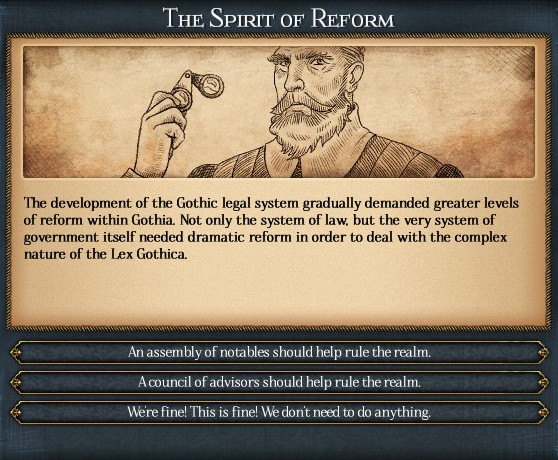 Reform could go in a couple different directions. The Gothic realm had inherited from Roman Gaul a tradition of regional assemblies; even in the high middle ages, some towns, particularly in the south and around the capital, still had curiales and were led by local non-noble families. The title of 'senator' had never fully died out either, although the venerable 'senatorial order' was largely an honorary role restricted to the nobility by the time of the Renaissance. From these old traditions, the idea of a 'Senate of the Goths', a realm-wide assembly of men from the provinces who could advise and assist in legislative and judicial duties, was floated by Humanist thinkers. The same tradition of curiales was taken in a different direction by King Tiuderic's inner circle. They argued that the curial model could be applied at a kingdom-wide level; rather than establishing a senate of men from the provinces, the king should establish a hand-picked council of leading men to personally advise him and assist in administration. Some men in Gothia, mainly from the lesser nobility, insisted that the kingdom's affairs were fine the way they were. For them, the feudal system was still an immense benefit, and realm-wise instability and inefficiency were not much of a (perceived) danger. King Tiuderic, increasingly paranoid and secretive, was inclined to favor reforms leading to the more closed 'curial' government proposed by his advisers, but such wide reforms needed support from all governing corners of the realm, and he could not simply ignore those who favored a senate (or favored outright inaction). The king began a period of consultation, with one simple question posed to notables across the realm: How should the government reform?
This consultation marked one of the king's rare moments of openness. He welcomed any votes on the matter, but once the vote concluded the matter would be final. Ofaloaf fucked around with this message at 21:56 on Feb 20, 2017 |
|
|
|
C. 
|
|
|
|

|
| # ? May 10, 2024 16:00 |
|
C
|
|
|





































 There should be a Gothic Senate, filled with honorable men from the provinces, would help guide the kingdom. The Senate would serve an advisory role and would not get a vote on all affairs in the realm, but the king would consult and heed the Senate on certain matters.
There should be a Gothic Senate, filled with honorable men from the provinces, would help guide the kingdom. The Senate would serve an advisory role and would not get a vote on all affairs in the realm, but the king would consult and heed the Senate on certain matters. The kingdom should be guided by a privy council of advisers. The king would consult with a select group of men on key matters of policy, but would not let the realm's broader assembly of men have a say in matters of governance.
The kingdom should be guided by a privy council of advisers. The king would consult with a select group of men on key matters of policy, but would not let the realm's broader assembly of men have a say in matters of governance. Nothing needs to be done, everything is fine in Gothia. Nothing about Gothia's government would be changed, if these men had their way.
Nothing needs to be done, everything is fine in Gothia. Nothing about Gothia's government would be changed, if these men had their way.